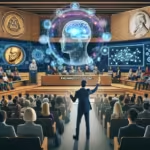Unveiling the Dual Role of AI in Advancing Humanity
Artificial Intelligence (AI) has emerged as one of the most transformative technologies of our time, pervading nearly every industry and aspect of modern life. Its influence is so profound that it was recently spotlighted in a Nobel Prize lecture, underscoring its dual role as a tool for advancement and a subject of ethical discourse. This article delves into the insights gathered from the prestigious lecture and explores AI’s multifaceted impact on our world.
The Nobel Context: Bridging AI and Human Achievement
The Nobel Prize lectures have long been a platform for disseminating groundbreaking research and ideas that shape our understanding of the universe. Inviting experts on AI to this prominent stage reflects the technology’s significant role in pushing human boundaries. The recent lecture highlighted not only the technical merits of AI but also the ethical, social, and philosophical questions it provokes.
As we unpack the discussions from the lecture, several key themes emerge, offering a comprehensive view of how AI is reshaping society. Let’s explore these themes in detail.
AI as a Driver of Innovation
One of the most notable aspects of AI is its ability to drive innovation across various sectors, creating opportunities and efficiencies that were once unimaginable. Here are a few examples:
– **Healthcare:** AI is revolutionizing diagnostics, enabling quicker and more accurate identification of diseases, thereby improving patient outcomes.
– **Finance:** Predictive analytics powered by AI help banks and financial institutions better assess risks and detect fraudulent activities.
– **Manufacturing:** Automation and machine learning algorithms enhance precision in production lines, leading to increased efficiency and reduced waste.
The lecture emphasized that, with AI, innovation isn’t just about technological advancements but also about redefining traditional approaches to problem-solving.
The Ethical Dilemmas of AI
While AI presents numerous benefits, it also raises important ethical questions. The Nobel lecture brought to light various ethical considerations that need addressing to ensure that AI advancements do not compromise fundamental human rights and values:
– **Privacy Concerns:** As AI systems process vast amounts of personal data, ensuring user privacy and preventing data misuse becomes paramount.
– **Bias and Fairness:** Algorithms can inadvertently perpetuate societal biases present in the data they are trained on, raising concerns about fairness and equality.
– **Accountability:** Determining who is responsible for decisions made by AI systems when those decisions impact human lives remains a challenging question.
It is crucial to develop robust frameworks that enforce ethical standards and guide the implementation of AI technologies to avoid potential pitfalls.
AI and the Workforce: A Symbiotic Relationship
A major topic of discussion in the lecture was AI’s impact on the workforce. While fears about automation replacing jobs are widespread, the reality is more nuanced. AI has the potential to augment human capabilities, creating a symbiotic relationship that can lead to a more productive and innovative workforce.
Job Transformation
Instead of eliminating jobs, AI is more likely to transform them. By automating routine tasks, employees can focus on more complex and creative challenges, leading to new roles and opportunities.
– **Skill Shifts:** As the demand shifts from routine to more sophisticated skills, there is a growing need for education systems and training programs to evolve accordingly.
– **Collaboration Between Humans and Machines:** Leveraging AI tools can enhance human decision-making processes, leading to better outcomes in various fields like medicine, engineering, and art.
Economic Implications
The economic impact of AI is enormous, with the potential for substantial GDP growth spurred by increased efficiency and productivity. However, realizing these gains requires strategic planning and investment in education and infrastructure to ensure equitable distribution of benefits.
Future Directions: Building Responsible AI
The lecture underscored the necessity of responsible AI development to maximize its potential while mitigating risks. Building AI systems that are transparent, accountable, and aligned with human values is vital for fostering trust and ensuring long-term success.
Interdisciplinary Approaches
To achieve responsible AI, an interdisciplinary approach is essential, bringing together insights from technology, ethics, sociology, and psychology. This comprehensive strategy will help anticipate and address challenges effectively.
Policy and Regulation
Governments and regulatory bodies must play a proactive role in shaping AI’s future. Establishing guidelines and legal frameworks can prevent misuse and encourage ethical practices in AI development and deployment.
Conclusion: Embracing AI’s Potentials and Challenges
The insights from the Nobel Prize lecture highlight AI’s pivotal role in shaping our future. While the technology holds immense promise, it also presents significant challenges that society must navigate diligently. By fostering a balanced approach that appreciates both AI’s potential and its ethical implications, we can build a future where AI serves as a force for good, driving progress and enhancing the quality of life for all.








